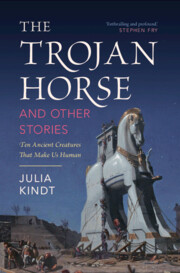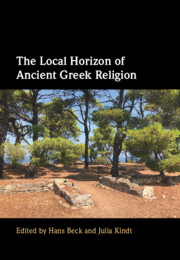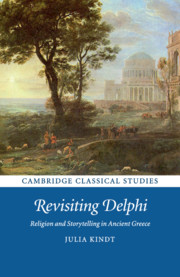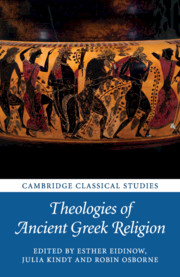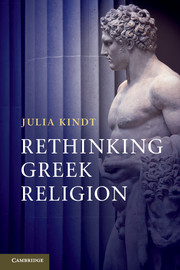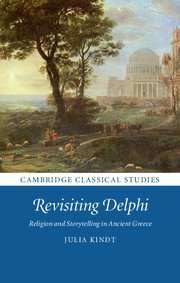The Trojan Horse and Other Stories
Ten Ancient Creatures That Make Us Human
$34.99 (T)
- Author: Julia Kindt, University of Sydney
- Date Published: February 2024
- availability: In stock
- format: Hardback
- isbn: 9781009411387
$
34.99
(T)
Hardback
Other available formats:
eBook
Looking for an examination copy?
If you are interested in the title for your course we can consider offering an examination copy. To register your interest please contact [email protected] providing details of the course you are teaching.
-
What makes us human? What, if anything, sets us apart from all other creatures? Ever since Charles Darwin's theory of evolution, the answer to these questions has pointed to our own intrinsic animal nature. Yet the idea that, in one way or another, our humanity is entangled with the non-human has a much longer and more venerable history. In the West, it goes all the way back to classical antiquity. This grippingly written and provocative book boldly reveals how the ancient world mobilised concepts of 'the animal' and 'animality' to conceive of the human in a variety of illuminating ways. Through ten stories about marvelous mythical beings – from the Trojan Horse to the Cyclops, and from Androcles' lion to the Minotaur – Julia Kindt unlocks fresh ways of thinking about humanity that extend from antiquity to the present and that ultimately challenge our understanding of who we really are.
Read more- Uses some of the most famous ancient stories and the marvelous creatures at their core to address one of the biggest questions of all time: what makes us human
- Entertainingly unpacks perennially fascinating myths – such as those about the Trojan Horse, the Sphinx, and the Minotaur – to shed new light on existential discussions of 'the human' and 'the animal
- Explores the transporting power of storytelling to think about humanity while constructing its own arresting narrative of revelatory tale-telling
- Julia Kindt is a regular contributor to The Conversation and the 8 articles she has published there have been accessed 400,000 times and shared widely on social media, including on Twitter and Facebook
Reviews & endorsements
‘Julia Kindt has found a miraculous new lens through which to scrutinise our oldest, most loved stories and find in them colours, shapes and qualities that we have never really seen before. Humankind's relationship with animals has been examined through archaeology, history and art, but never before, to my knowledge, through myth, legend and story. The insights that this absorbing and imaginative approach reveal are enthralling and profound. The stories are told with wit, imagination and sparkle; the animals who star in them brought wondrously to life.' Stephen Fry
See more reviews‘Kindt's wide-ranging volume tackles a question seldom addressed in the ever-expanding literature of ancient animal studies: how do non-human animals make us human? Investigating this question through an examination of ten animals and animal types that appear in classical mythology and history and live on in recent literature and art, she offers fresh insights on issues central to ancient animal studies, including the nature of animal intellect and emotion, the ethical obligations of human beings toward other species, and the significance of hybridity and metamorphosis. Kindt's scrupulously researched yet highly readable text will prove informative and stimulating to classical scholars and non-specialists alike.' Stephen T. Newmyer, Duquesne University
‘In this beautifully written and timely book, Julia Kindt provides a fascinating account of how humans use real and imaginary animals to think about what it means to be human and an eloquent defence of the power of storytelling. With each of its chapters comparing classical and modern sources in innovative, accessible and engaging ways, The Trojan Horse and Other Stories is sure to start an important conversation about how the ancient world foreshadows our contemporary consideration of the human-animal relation.' Chris Danta, Australian National University
‘The stories from ancient Greece are foundational for all our imaginations – and they are some of the best and long-lasting stories we have! Julia Kindt is a wonderful guide to what they are, what they mean and how they have influenced us.' Simon Goldhill, University of Cambridge
‘Deeply insightful and erudite … Highly recommended for both disciples and skeptics of classics.' Evan M. Anderson, Library Journal (starred review)
‘A truly thought-provoking book and a delight to read. It is addressed to the intelligent and educated reader, rather than to a handful of fellow specialists. The scholarship is extensive and thoroughly but discreetly referenced, so that it is easy to follow up any leads of particular interest. Although most of Kindt’s readers will no doubt have some familiarity with many or all of the subjects she deals with, she never takes this for granted. Above all, she does not approach the past, as so often today, with an agenda or a set of judgements formed in advance of studying the material - in other words prejudices - but instead adopts a truly hermeneutic method, seeking first to understand what these stories and themes meant in their own time and, on that foundation, pursuing their subsequent history and their resonance for us today.’ Christopher Allen, Australian Book Review
‘… if we go beyond philosophy to storytelling, suggests Julia Kindt in her sparky and stimulating book for the general reader, we can uncover a richer understanding of how animals have been used to shape ideas of what it means to be human.’ Helen Morales, Times Literary Supplement
‘Kindt writes lucidly and with a splendid verve that erupts in the occasional, lively and well-timed pun. The narrative is also richly illustrated with numerous images. I enjoyed reading and learning from this book and recommend it with enthusiasm.’ James J. Clauss, Bryn Mawr Classical Review
Customer reviews
Not yet reviewed
Be the first to review
Review was not posted due to profanity
×Product details
- Date Published: February 2024
- format: Hardback
- isbn: 9781009411387
- length: 380 pages
- dimensions: 236 x 162 x 20 mm
- weight: 0.74kg
- contains: 35 colour illus.
- availability: In stock
Table of Contents
Introduction
1. The Sphinx (Sphinx aenigmatica)
2. Xanthus, Achilles' Speaking Horse (Equus eloquens)
3. The Lion of Androclus (Panthera leo philanthropus)
4. The Cyclops (Cyclops inhospitalis)
5. The Trojan Horse (Equus troianus)
6. The 'Trojan' Boar (Aper troianus ostentator)
7. The Political Bee (Apis politica)
8. The Socratic Gadfly (Haematopota oxyglotta socratis)
9. The Minotaur (Hybrida minotaurus)
10. The Shearwaters of Diomedea (Calonectris diomedea transformata)
Conclusion.
Sorry, this resource is locked
Please register or sign in to request access. If you are having problems accessing these resources please email [email protected]
Register Sign in» Proceed
You are now leaving the Cambridge University Press website. Your eBook purchase and download will be completed by our partner www.ebooks.com. Please see the permission section of the www.ebooks.com catalogue page for details of the print & copy limits on our eBooks.
Continue ×Are you sure you want to delete your account?
This cannot be undone.
Thank you for your feedback which will help us improve our service.
If you requested a response, we will make sure to get back to you shortly.
×
